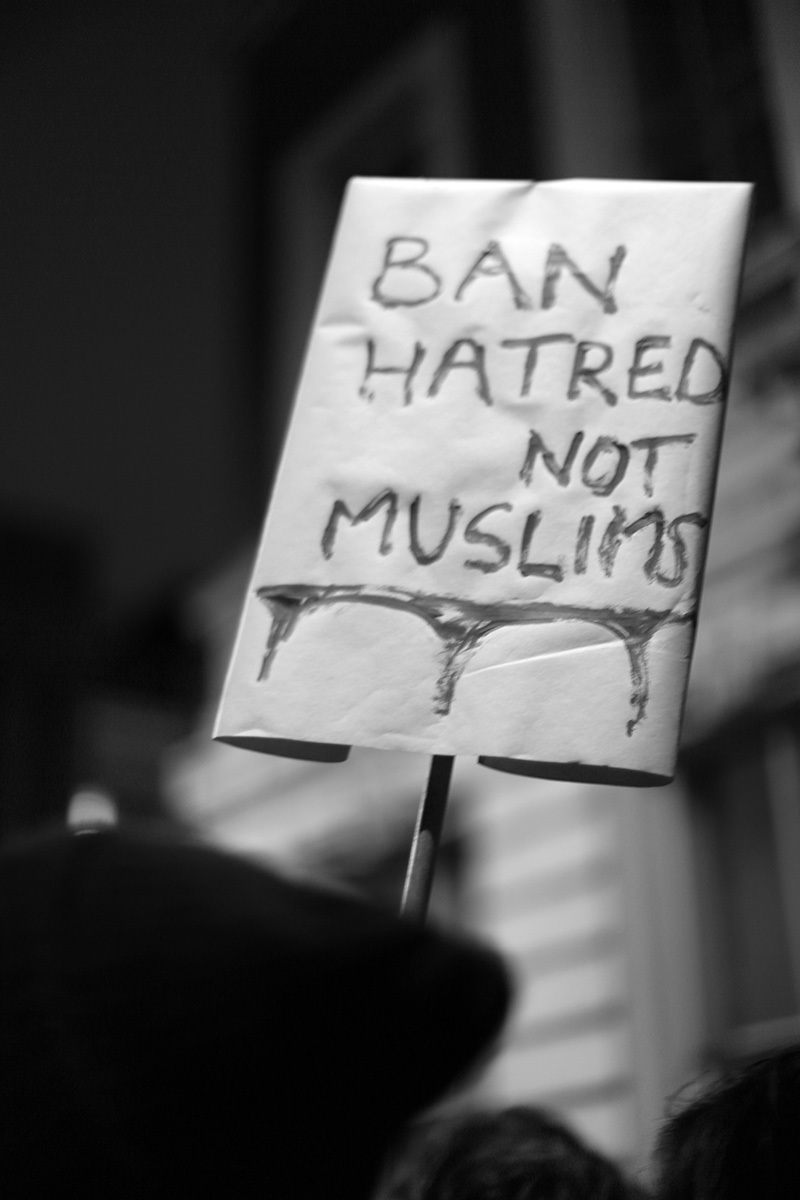Friday saw Donald Trump sign off on an executive order banning residents of seven predominantly Muslim countries from entering the US. By Saturday evening, US airports were in a state of extreme confusion and panic as authorities struggled to implement the hastily actioned dictate. Pre-approved refugees, students and workers holding visas and residency green cards were stopped from boarding flights to the US, whilst others who had arrived earlier were detained at airports across the country. The immigration ban – which has since taken on the name the ‘Muslim Ban’ – temporarily prevents refugees from around the world from coming to the US, blocks Syrian refugees indefinitely, and denies entry for people from seven majority Muslim countries – Iran, Iraq, Libya, Somalia, Sudan, Syria and Yemen – for 90 days. The move has shocked many who thought Trump’s inflammatory statements about banning Muslims and building a wall between the US and Mexico were little more than empty promises to win over an electorate that feels increasingly threatened by black and brown progress. Sadly, it is abundantly clear now that these campaign promises were not just sensationalism. Trump is turning the racist rhetoric he rose to power on into policy, and so far the democratic institutions put in place to stop him, as well as public outcry from world leaders, seem unable to make him do anything other than what he pleases.
Well what does this all mean? The order will mean lives, careers, degrees and families are put on hold for millions. Trump has defended the policy as an “extreme vetting” process intended to “keep terrorists out” of the US, but as pointed out by many critics, no one in the United States has been killed in a terrorist attack by someone from the seven countries whose citizens Trump has temporarily barred from admission. Furthermore, many of the citizens of those countries already faced extreme difficulty obtaining visas of any kind for the United States; vetting has been particularly stringent since 9/11 and screening processes often last years. In fact, what all seven of the countries have in common is that the US government has violently intervened in them. With the exception of Iran, the US is currently bombing or has recently bombed them all, leading some to argue that the policy translates into ‘If we bombed you, we ban you.”
Trump’s swift implementation of this policy was only made possible by the Obama administration creating the scaffolds for it – the seven banned countries were identified as areas of concern by the Terrorist Prevention Act of 2015, which resulted in dual citizens being exempt from the visa waiver. I personally found this out last year after booking a return flight via Miami. Whereas before I would have been able to fill out an ESTA online like any other British citizen, my dual British-Iranian nationality meant that I now had to pay $160 and go to the US embassy to be interviewed for a visa, all to transit through the US for a total of two hours. I am, along with millions of other Iranians, now barred from entering the US entirely. The ban has hit the roughly 1 million Iranian-Americans particularly hard. For its part, Iran has responded by putting in place a travel ban on American citizens, leaving many Iranians in a stateless limbo and unable to see their families for the foreseeable future.
Aside from the unconstitutional nature of the ban, it is obviously morally wrong. No one should be denied access to a country due to their race or religion, much less sent back to war zones which they have just escaped from, which will be the case for many of the refugees who have fought for months or years for the ‘privilege’ of re-settling in the US. Trump stated that “we don’t want them here” in reference to ‘Islamic terrorists’, but it is hard not to think that what he really means is Muslims in general. He has tried to argue that the executive order is not a Muslim ban as there are many other Muslim majority countries not on the list, an argument that is clearly undermined by not only the demographics of the countries affected by the ban but by a clause that argues non-Muslim refugees from those countries be given preference for resettlement. His attitude and xenophobic rhetoric will also have a dangerous impact on public attitudes towards Muslim immigrants, refugees, citizens and tourists who are already the targets of an increasingly high number of hate crimes; mere hours after Trump announced the ban, a mosque in Texas went up in flames following an arson attack. Policy such as this further stigmatises Muslim refugees who have fled the very terrorists that Trump is supposedly worried about, and provides justification for bigotry in a country that is already torn apart with hatred and suspicion.
Read: Tens of thousands hit the streets in London and across the UK to protest Trump’s Muslim ban.
What the Muslim ban represents is the codification and further entrenchment of a xenophobia that’s defined Western interaction with Islam since before Trump – decades of violence have normalised violence against prejudice. Since 9/11, Muslims have become used to living under increased suspicion, terror and harassment. Many Muslim women, often on the front lines of harassment and racist attacks due to their visibility, have stopped wearing the hijab for fear of their own safety. In a country that supposedly values its constitution above all else, the fact that American Muslims increasingly fear practicing their religion due to racist and state-sanctioned bigotry is unacceptable.
Policies like this only serve to exacerbate this dangerous and hate-fuelled environment whilst ultimately proving ineffective in its supposed goal of stopping terrorism. No one chooses to be born in one place or another, and causing suffering for millions of innocent people is unjustifiable on any grounds.
Credits
Text Niloufar Haidari
Photography Lily Rose Thomas
